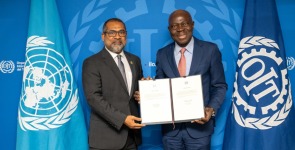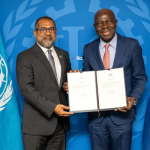
The Maldives faces a pressing dual challenge: managing economic growth while addressing the increasing threats posed by climate change. According to the latest Maldives Development Update by the World Bank, released this month, the country is grappling with the intertwined impacts of climate change and development, which could have significant long-term consequences for its economy and environment.
Rising Sea Levels and Economic Impact
The report highlights sea-level rise (SLR) as one of the most significant climate change concerns for the Maldives. Projections suggest that sea levels could rise by up to 0.9 metres by the end of the century, which, without adaptation, could lead to severe coastal flooding. This is expected to damage up to 3.3% of total assets by 2050 during typical 10-year floods. In economic terms, the impact could be devastating, with the Maldives’ GDP projected to shrink by nearly 11 percentage points by 2050 under a high-emission scenario.
However, the World Bank report notes that with sustained investment in reconstruction and adaptation measures, these impacts could be reduced, limiting the GDP reduction to under 6%. This makes it clear that strategic investments in climate resilience and adaptation are critical for the country’s future.
The Role of Coral Reefs and Fisheries
The Maldives’ natural defences, particularly its coral reefs, have historically protected the islands from rising seas and provided essential ecosystem services, including sand production. However, the report warns that coral reefs are under threat due to both global warming and local stressors, such as coastal development and pollution. It estimates that nearly all coral cover could be lost if global temperatures rise above 2°C, further exacerbating the vulnerabilities of the islands.
The report also projects a dramatic decline in fish stocks under high-emission scenarios, with almost 100% of revenue from fisheries at risk by the end of the century if no adaptation measures are taken. The Maldives’ economy, which relies heavily on tourism and fisheries, is intimately tied to the health of its marine ecosystems, making climate change adaptation in these sectors particularly urgent.
Policy Recommendations and Investment Needs
To address these challenges, the report offers several key recommendations for climate resilience and green transitions. One critical priority is to strengthen the regulatory framework for the tourism sector to ensure that new resorts and guesthouses are developed using climate-resilient infrastructure. The report reveals that over 90% of resorts are currently dealing with moderate to severe beach erosion, and about 60% have faced infrastructure damage due to climate-related events. Accelerating climate adaptation efforts in the tourism sector is crucial for the Maldives to remain a premier global destination.
The report estimates that financing requirements for climate adaptation, particularly for sea-level rise and flooding, could range between US$2 billion and US$4 billion. This figure does not account for other adaptation needs, such as mitigating ocean warming impacts. Securing the necessary financing remains a major challenge, given the country’s limited fiscal space and external vulnerabilities.
Mobilising Climate Finance
To mobilise the funds required for climate action, the report emphasises the need for comprehensive reforms. This includes improving access to concessional financing, expanding public-private partnerships, and tapping into carbon markets. Moreover, measures such as increasing the Green Tax and revising airport taxes could provide additional revenue streams for climate-related investments.
Restoring fiscal space, building external buffers, and ensuring macroeconomic stability are essential for the Maldives to mobilise the financing required to safeguard its future. Without significant investment in climate resilience, the country risks facing severe economic and environmental consequences in the decades to come.
As the Maldives continues its journey towards sustainable development, addressing the complex interplay between climate change and economic growth will be pivotal. The recommendations outlined in the Maldives Development Update serve as a roadmap for ensuring that the nation is well-prepared to tackle the challenges ahead, while also seizing opportunities to build a greener, more resilient future.











